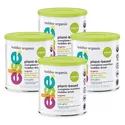How Much Formula to Give When Supplementing?
The role of formula supplementation in promoting a healthy start for your baby. Explore vital insights for supporting their overall health.
Updated May 17, 2024

Moms know that breastfeeding isn’t easy work. Although it’s a special time to bond with your child, feeding sessions can take up to an hour, and latching can be painful for some women. And then there’s the seemingly endless amount of breastmilk a growing baby demands.
This is why many moms choose (or are professionally recommended) to supplement their breastfeeding with formula milk, especially as their breastfeeding journey progresses and the child ages into a toddler.
But weaning your baby off breastfeeding isn’t an overnight process. You must ensure that the baby’s feedings are supplemented correctly. Let's see how you can know when to switch from supplemental formula to regular. Uncover the smartest approach for you and your little one.
What is Formula Supplementation?
Supplementing combines the nutritional powers of breast milk with formula feeding. These supplemental formulas begin with precisely made nutritional baby formulas and then transition to toddler formulas as babies grow older. F
Formula supplementation is a safe way to relieve mothers stuck in the constant feeding cycle while ensuring that babies or toddlers receive all the nutrients they need to grow.
The American Academy of Pediatrics (AAP) recommends mothers breastfeed for the first six months post-pregnancy and then slowly introduce solid foods or supplementing formula over the next year. However, some mothers formula feed or add supplements within the first few weeks post-pregnancy!
» Learn how to transition a baby from breast milk to formula
How Much Formula To Supplement?
Generally speaking, babies eat when hungry and stop when they’re full. In the initial infant months, babies should be fed whenever they get fussy.
If you’re supplementing your breastfed infant early on, don't introduce more than a bottle or two (per day) of infant formula in the early weeks unless required.
If you want to breastfeed, you should avoid mixed feeding. Women’s breast milk functions on a supply-and-demand basis, so you'll experience a reduced milk supply as you breastfeed less.
Your natural milk production wanes as you supplement more with formula feeding. So, it’s best to start slow and let your and your child’s body adapt to this dietary change.
Supplement Schedule
For a baby that’s using formula in place of breastfeeding, the proper supplement schedule looks like this:
- First few weeks: Baby will require 2 to 3 oz of formula every meal, with a feeding schedule once every 3 to 4 hours.
- Month 1: Baby will require at least 4 oz of formula every meal, with a feeding schedule once every 4 hours.
- Month 6: The baby will likely eat 6 to 8 oz at every meal, with four to five feedings every 24 hours.
- After 6 Months: Your baby should consume 2.5 oz of formula daily for every pound of body weight. Typically, your baby will signal to you when they’re hungry or satiated, and you can feed accordingly.
- 12 months: Start supplementing the baby’s solid food with toddler formula. It is recommended that you choose a plant-based, organic formula.
» Check out a step-by-step guide for supplementing your baby with formula at night
Reasons to Supplement
When it comes to why a mom starts to supplement, their reasons are varied. They include but are not limited to:
- Breastfed baby has medical issues: A baby born prematurely or has certain medical conditions may need more than just breast milk to gain weight.
- Toddler with milk allergies: Cow's milk is one of the most common allergies for toddlers. Formula can be an excellent substitute for supplemental dairy products.
- Unable to keep up with baby’s demand: If your baby’s doctor feels you aren’t producing enough milk, they will likely recommend supplementing.
- Partner wants to help feed: Sometimes, your partner wants to help handle a feeding session or two. With this, you could either pump into a bottle or supplement with baby formula.
- Returning to work: Returning to work can change the feeding schedule, which could reduce your breast milk supply. You may need to supplement your child’s diet with formula.
- Multiple mouths to feed: Having twins could pose a significant challenge to breast milk production. Not only do you need enough breastmilk, but you’re also feeding for two! Formula can help.
Signs Your Baby Needs a Supplemental Formula
Typically, doctors highlight specific “signals” that prove your baby is receiving adequate breast milk. These include but are not limited to:
- Safe, steady weight gain: Babies lose around 10% of their birth weight in their first week of life. After, the baby should gain half an ounce to an ounce per day for the following three months.
- Lots of wet and dirty diapers: After a few days, the baby should produce at least six wet diapers and three stools within 24 hours.
- Productive nursing: A baby should nurse at least 8 to 12 times every 24 hours during the first month. Sessions should stay between 15 and 45 minutes, and you need to ensure you can hear the baby swallow.
If you notice that your baby has lost more weight than normal, they aren’t producing enough diapers, or their nursing sessions are either overly long or short, it may be a sign that your baby needs supplemental formula to help their growth. Consult with your doctor immediately to determine the proper course of action. Else Nutrition's Plant-Based Complete Nutrition for Toddlers is certified organic and dairy-free, filled with essential nutrients crafted for healthy weight gain.
Adding Formula to Your Baby's Feeding Routine
After you’ve added formula to the feeding routine, be sure to monitor signs of your baby’s growth and constitution. You should be on the right track if the baby is happy, growing steadily, and producing wet diapers.
However, keep an eye out for signs formula doesn’t agree with baby, such as spitting up, vomiting, or tummy discomfort, as they could indicate that your baby is ingesting too much formula.
How Adding Formula Can Affect Your Baby
If you’ve only been breastfeeding, slowly adding supplements to their feeding sessions will likely have some noticeable impacts on your baby. To that end, a few natural adjustments may include:
- Longer breaks between feedings: It’s much easier for a baby's belly to digest breast milk than an infant or toddler formula. This makes them feel fuller for longer. As a result, once you start supplementing, your baby may not seem to gain an appetite as quickly after a meal.
- Refusing the bottle: Some babies take a while to transition from breast to bottle feeding. Others flat-out refuse. A baby may need some coaxing to make the switch.
- Refusing the breast: On the flip side, some babies and infants like formula—so much so that they no longer want to nurse. Drinking formula is easier and more satisfying for many young ones than breastfeeding.
- Bowel movement changes: If you add formula to your baby’s diet, you can expect changes in the color, consistency, and pattern of your baby’s stool. Bowel movements may occur less frequently, have a more pungent odor, and become darker and firmer.
How to Choose the Right Baby Formula
Today, there are dozens of baby formula supplements available. The sheer volume of options can make it challenging to identify the right formula for your child. With that being said, there are four key qualities that a baby formula should have:
1. Proper Nutritional Balance
The FDA has created specific regulations for the necessary fat, protein, and carbohydrate concentrations. Your baby’s food should contain the ideal combination of nutritional elements to support healthy growth.
2. Organic Formula
Many baby formula is made using synthetic or genetically modified ingredients. When searching for an organic baby formula, look for a label that says “certified organic” to know your child’s nutritional source is safe and natural.
3. Whole Food Ingredients
An adequate nutritional supply is more likely to come from whole food ingredients than isolated components. Your child’s baby formula should contain mainly whole food ingredients with zero synthetic ingredients.
4. Vitamins A & D
There are dozens of vitamins that a baby needs to grow healthy and strong. Few are more important in the early stages of development than vitamins D and A. On the other hand, be wary of products containing GMOs, vegetable oils, and heavy metals—all of which can negatively affect a baby’s health. Else Nutrition' Toddler Original Plant-Based Complete Nutrition Drink is USDA-Certified Organic, so you don't have to worry about hidden unsafe ingredients and nasties.
ELSE: The Ideal Plant-Based, Non-Soy Toddler Formula
Supplementing is an important process that many mothers utilize to ensure their baby receives adequate nutrition. But when first beginning, it’s important that you consult your doctor. Once you’ve introduced a supplement, make your child’s transition gradual.
Let your baby and body adjust to the new routine before making big adjustments. Check out our blog article on how to switch formulas so that if your child is over 12 months old, you can make a healthy switch to Else today.
Best Formula for Your Toddler
At Else, we provide complete nutrition using a plant-based organic supplement formulated with three main ingredients: organic almonds, tapioca, and buckwheat. We’re the natural, doctor-recommended alternative to a dairy-based formula.
The content and advice provided in this article is for informational purposes only and is not a substitute for medical diagnosis, treatment, advice for specific medical conditions. Always consult a pediatrician to understand the individual needs of your child.
Sources
- AAP. Breastfeeding and the Use of Human Milk. https://pediatrics.aappublications.org/content/129/3/e827
- What to Expect. Why Don’t We Tell Moms How Hard Breastfeeding Is? https://www.whattoexpect.com/news/first-year/why-dont-we-tell-moms-how-hard-breastfeeding-is/
- Stanford Medicine. Infant with Loss of 10% Birth Weight. https://med.stanford.edu/newborns/professional-education/breastfeeding/babies-at-risk/infant-with-loss-of-10--birth-weight.html









